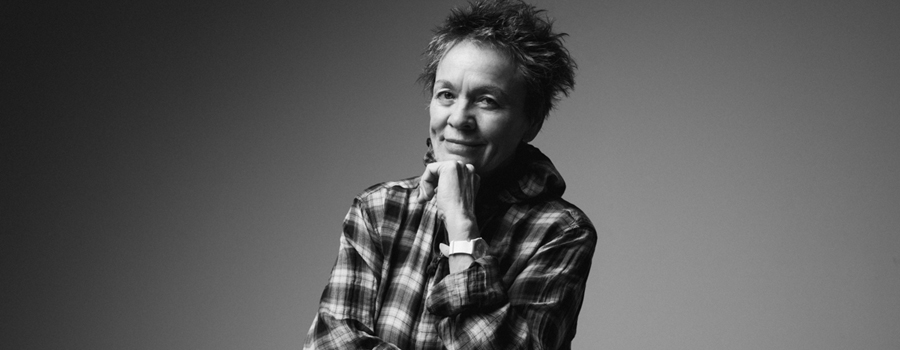
Party in the Bardo: Conversations with Laurie Anderson—Episode Three
Friday, July 3, 2020 at 4:00am
WESU Middletown 88.1FM
Friday, July 3, 2020 at 4:00pm
WESU Middletown 88.1FM
Thursday, March 4, 2021 at 10:00pm
WESU Middletown 88.1FM
Click here to stream this two-hour episode from WESU's show archives.
Epsiode Three includes Paul Muldoon reading his "Drive-by at the Drive-in" (a remake of Aristophanes' "The Frogs"), plus recordings and music by Walt Whitman, Alfred, Lord Tennyson, William Butler Yeats, Lou Reed, Van Morrison, Tommy and Sarah Makem, Lee Knight, Bert Jansch, Allen Ginsberg, and two tracks by Bob Dylan.
Muldoon also took part in "After Party in the Bardo: A Conversation with Laurie Anderson" on Thursday, November 12, 2020 at 7pm.
Born in 1951 in Portadown, Co. Armagh, Northern Ireland, to Patrick Muldoon, a farm laborer and market gardener, and Brigid Regan, a schoolteacher, Paul Muldoon was brought up near a village called The Moy on the border of counties Armagh and Tyrone. He is the oldest of three children. After studying at Queen’s University, Belfast, he published his first book, New Weather (Faber), in 1973, at the age of 21. Staring in 1973 he worked as a producer for the BBC in Belfast until, in the mid-1980s, he gave up his job to become a freelance writer and moved to the United States with his second wife, the American novelist Jean Hanff Korelitz. He now lives in New York City and Sharon Springs, New York. He is the father of two children.
Muldoon is the author of fourteen full-length collections of poetry, including Howdie-Skelp (2021), Frolic and Detour (2019), One Thousand Things Worth Knowing (2015), Maggot (2010), Horse Latitudes (2006), Moy Sand and Gravel (2002), Hay (1998), The Annals of Chile (1994), Madoc: A Mystery (1990), Meeting the British (1987), Quoof (1983), Why Brownlee Left (1980), Mules (1977), and New Weather (1973). He has also published innumerable smaller collections, works of criticism, opera libretti, books for children, song lyrics, and radio and television drama. His poetry has been translated into twenty languages.
Muldoon served as Professor of Poetry at Oxford University from 1999 to 2004 and as poetry editor of The New Yorker from 2007 to 2017. He has taught at Princeton University since 1987 and currently occupies the Howard G.B. Clark ’21 chair in the Humanities. He was the Founding Chair of the Lewis Center for the Arts. In addition to being much in demand as a reader and lecturer, he occasionally appears with a spoken word music group, Rogue Oliphant.
Paul Muldoon is a Fellow of the Royal Society of Literature, the American Academy of Arts and Sciences and the American Academy of Arts and Letters. Among his awards are the 1972 Eric Gregory Award, the 1994 T. S. Eliot Prize, the 1997 Irish Times Poetry Prize, the 2003 Pulitzer Prize for Poetry, the 2003 Griffin International Prize for Excellence in Poetry, the 2004 American Ireland Fund Literary Award, the 2004 Shakespeare Prize, the 2006 European Prize for Poetry, the 2015 Pigott Poetry Prize, the 2017 Spirit of Ireland Award from the Irish Arts Center (New York City), the 2017 Queen's Gold Medal for Poetry, and the 2018 Seamus Heaney Award for Arts and Letters. He is the recipient of honorary doctorates from ten universities.
Paul Muldoon has been described by The Times Literary Supplement as "the most significant English-language poet born since the second World War." Roger Rosenblatt, writing in The New York Times Book Review, described Paul Muldoon as "one of the great poets of the past hundred years, who can be everything in his poems - word-playful, lyrical, hilarious, melancholy. And angry. Only Yeats before him could write with such measured fury."
Laurie Anderson has created groundbreaking works that span the worlds of art, theater, and experimental music. A renowned and daring creative pioneer, she has contributed music to dance pieces by Bill T. Jones and Trisha Brown. Her 2018 recording with the Kronos Quartet, "Landfall," won a GRAMMY Award. Her most recent collaboration is 2019’s “Songs from the Bardo” with Tenzin Choegyal and Jesse Paris Smith.
“Since the early ‘80s, I’ve dreamed of...having a radio show in the middle of the night” said Laurie Anderson. “When time slows down, where the lines between sleeping and waking, between dreams and reality, are getting blurred, and when people’s defenses drop away, and logic just seems to be very limiting.”
“Party in the Bardo: Conversations with Laurie Anderson” brings listeners into intimate conversations between Anderson and her close friends and colleagues—artists, writers, and thinkers who share Anderson’s zeal to ask questions, explore, and understand the world. “Party in the Bardo” was created for this moment in time, when our global and local communities are grappling with the new reality of COVID-19. In Tibetan tradition, the “Bardo” is the in-between: a state of existence after death and before one’s next birth, when consciousness is not connected to a physical body. By design, each episode will premiere on Friday at 4am, when thoughts drift and new connections become possible —and a time, in 2020, when many of us are awake and wondering at the moment we are living though. (For those who sleep well, “Party in the Bardo” will also air again the same day at 4pm.)
“Party in the Bardo” was created and hosted by Laurie Anderson as part of her 2019-2020 artist residence at Wesleyan University, and is funded by The Andrew W. Mellon Foundation and the Philip J. '71 and Lynn Rauch Fund for Innovation, with support from Wesleyan University’s Center for the Arts and WESU Middletown 88.1 FM.
Image of Laurie Anderson by Ebru Yildiz. Thumbnail of Paul Muldoon by Beowulf Sheehan.